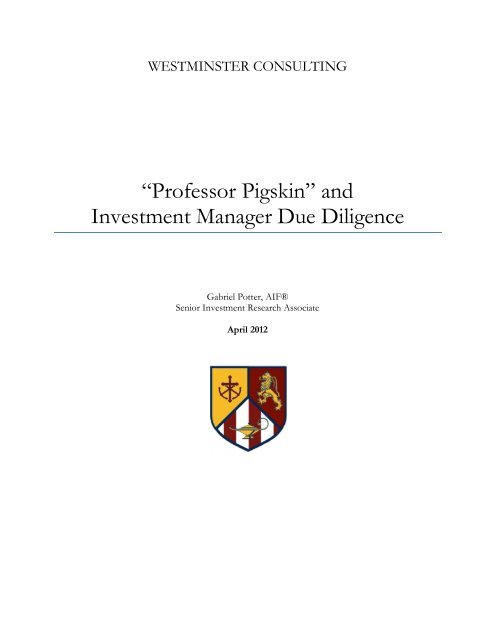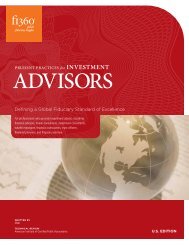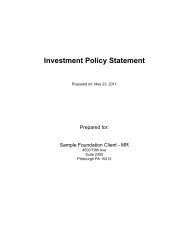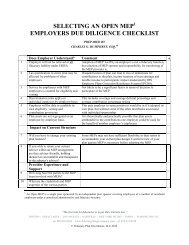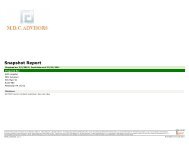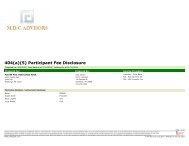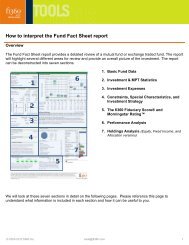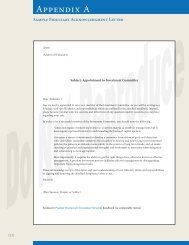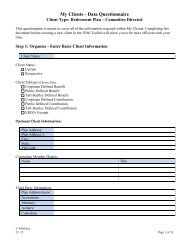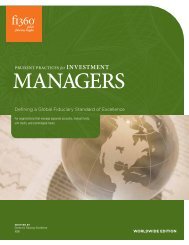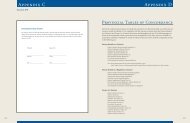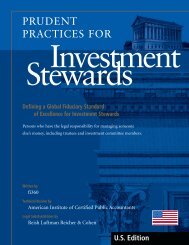and Investment Manager Due Diligence - Fi360
and Investment Manager Due Diligence - Fi360
and Investment Manager Due Diligence - Fi360
You also want an ePaper? Increase the reach of your titles
YUMPU automatically turns print PDFs into web optimized ePapers that Google loves.
WESTMINSTER CONSULTING<br />
“Professor Pigskin” <strong>and</strong><br />
<strong>Investment</strong> <strong>Manager</strong> <strong>Due</strong> <strong>Diligence</strong><br />
Gabriel Potter, AIF®<br />
Senior <strong>Investment</strong> Research Associate<br />
April 2012
Westminster Consulting<br />
<strong>Investment</strong> <strong>Manager</strong> <strong>Due</strong> <strong>Diligence</strong><br />
As a fiduciary, the process of vetting, selecting <strong>and</strong> monitoring an investment manager is critically<br />
important. But how do professional investment consultants go about this process? When<br />
confronted by complex, deeply-technical questions posed by industry professionals, I usually turn to<br />
The Simpsons for guidance.<br />
Wait, did you say The Simpsons?<br />
I’m going to assume that most readers of this newsletter are familiar with the long-running animated<br />
series “The Simpsons”. There is the gullible patriarch - Homer Simpson, <strong>and</strong> his more perceptive<br />
daughter - Lisa. In this scene, Homer <strong>and</strong> Lisa are watching football on television, <strong>and</strong> Homer is<br />
holding a mail-pamphlet that says “Professor Pigskin”:<br />
Homer: “Doh! The Broncos won! Why didn’t I bet on them like Professor Pigskin told me to?”<br />
Lisa: “Who’s Professor Pigskin?"<br />
Homer: "He’s a pig who can predict football winners in advance."<br />
Lisa: "How is that possible?"<br />
Homer: "Because he’s got something no gambler’s ever had. A System! I’ve got this pamphlet<br />
four weeks in a row <strong>and</strong> every time the pick of the week has been right on the money."<br />
Lisa: "Ohhh. I get it. Every week they send out two pamphlets, half picking one team <strong>and</strong> half<br />
picking the other. Eventually, there’s a small group of people who only receive the correct<br />
predictions <strong>and</strong> think Professor Pigskin is always right. That’s when they ask for your money."<br />
It is too late by this point: Homer is already sending his credit card information to “Professor<br />
Pigskin” for insight into next week’s football game. Of course, Professor Pigskin is a scam, the pick<br />
Homer gets is wrong, <strong>and</strong> he loses a pile of money on a bad bet.<br />
I often consider the example of Professor Pigskin when conducting due diligence on investment<br />
managers. An investment manager typically uses a system to put together their portfolio. It can be<br />
a sound system, based on earnings quality, relative valuation, balance sheet strength, price<br />
momentum or any of a thous<strong>and</strong> – completely valid - reasons. But success, as we see from the<br />
example of Professor Pigskin, can easily come from an arbitrary system as well.<br />
Imagine for a moment that every investment manager operates on luck alone. Imagine their stock<br />
selection “process” is to simply throw darts at the Wall Street Journal <strong>and</strong> buy equal amounts of any<br />
stock hit by a dart. By luck, some managers are bound to outperform their peers. By definition, half<br />
of the investment managers are going to perform better than their peer group in any given time<br />
period. Given a large enough sample, some managers are assuredly going to outperform the index.
Westminster Consulting<br />
The point is performance data is insufficient to determine if a manager is good or bad. So, given<br />
this, how do you separate luck <strong>and</strong> r<strong>and</strong>om chance from good decision making? How do you know<br />
if you’re getting a “good” investment manager?<br />
Key to <strong>Investment</strong> <strong>Manager</strong> <strong>Due</strong> <strong>Diligence</strong>: Continuous monitoring of many attributes<br />
Again, just looking at the performance numbers is insufficient. The best managers periodically<br />
underperform <strong>and</strong> overperform their index. The “batting average” – the percentage of time that a<br />
manager outperforms their benchmark - for the best investment managers is only around 60%. In<br />
other words, the very best managers have historically underperformed their benchmark 40% of the<br />
time, often for a number of years. In addition, the timing of the investment manager screening can<br />
have a large impact on the final selection.<br />
Example: The ABC fund is an aggressive, high-risk, high-conviction mutual fund that makes large<br />
bets on individual stocks <strong>and</strong> sectors. Sometimes, the large bets pay off h<strong>and</strong>somely. Sometimes,<br />
the large bets are completely misplaced <strong>and</strong> the fund drastically underperforms. When measured last<br />
quarter, the volatility of the fund was high, <strong>and</strong> long term relative performance was below both<br />
peers <strong>and</strong> the index. <strong>Manager</strong> ABC has suffered tremendous fund outflows <strong>and</strong> has decided on a<br />
desperate <strong>and</strong> risky bet towards a h<strong>and</strong>ful of high-risk stocks. They got lucky <strong>and</strong>, this quarter, their<br />
bet paid off. The few stocks selected by ABC sharply outperformed the market. In fact,<br />
outperformance was so high in this concentrated portfolio that the product’s long term annualized<br />
averages now outpaces peers <strong>and</strong> the benchmark.<br />
An unsophisticated investor – looking at long term risk <strong>and</strong> long term reward numbers alone – may<br />
have an inaccurate assessment of the fund. The unsophisticated investor acknowledges that the<br />
fund has high risk, but haven’t long term investors been compensated by advantageous long term<br />
returns?<br />
This example supports the case for a broad variety of screening criteria. For instance, an industry<br />
leading mutual fund screening tool sorts funds against a variety of quantitative attributes (long term<br />
performance relative to peers, risk relative to peers, <strong>and</strong> so on). In this case, the ABC fund may<br />
have high risk <strong>and</strong> return, but the risk-adjusted return metrics may still be poor relative to peers.<br />
This tool may also register the change to the portfolio (proportion of allowable assets, consistency<br />
of peer group / category). Looking at the fund’s net inflows will verify if enough long term<br />
investors really have been compensated for the risk, or if the fund’s small size implies a lack of<br />
stability. Furthermore, this example suggests the value of continuous screening over time. This tool<br />
makes these measurements continuously (every quarter, in this instance). The ABC fund may get a<br />
better score from the tool, due to the tremendous outperformance, for this quarter. However, the<br />
database keeps track of the previous quarters where the timing was not favorable to the ABC fund.<br />
By using long-term averages in scoring methodology, a consultant can get a better sense of the<br />
consistency of relative performance.
Westminster Consulting<br />
Key to <strong>Investment</strong> <strong>Manager</strong> <strong>Due</strong> <strong>Diligence</strong>: Underst<strong>and</strong>ing Style<br />
Another example: Imagine that you are a 401(k) plan sponsor during the 2008 financial crisis. The<br />
stock markets are being sorely damaged by the financial crisis, <strong>and</strong> your current investment manager<br />
– Mutual fund AGG - cannot even keep up with the very low benchmark. You decide to get a<br />
replacement. You conduct an investment manager search <strong>and</strong> find Mutual Fund DEF has had<br />
fantastic relative performance in both the short term <strong>and</strong> long term. You hire <strong>Manager</strong> DEF in<br />
early 2009 <strong>and</strong> hope for the best. The markets start to improve, but <strong>Manager</strong> DEF continually<br />
underperforms the market for several years. What happened?<br />
In this case, the plan sponsor simply may not realize that <strong>Manager</strong> DEF is following a defensive<br />
strategy: a strategy that tends to protect money in down markets, but fall behind the market in<br />
optimistic, upward moving markets. Worse, you may have left mutual fund AGG – an aggressive<br />
high-beta fund – at precisely the wrong time. As a high-beta fund, Mutual Fund AGG started to<br />
significantly outperform once the markets improved.<br />
This sort of thing happens all the time. A manager is hired because his style is in favor, but when<br />
the market favors a different style, relative performance suffers. The adage used in finance circles is:<br />
“don’t chase the hot dot”. In other words, do not select investments – a manager, an investment<br />
style, or even an asset class - solely because it is the greatest outperformer at the moment.<br />
Again, we are looking for a “good” investment manager, but that means different things to different<br />
clients. For instance, Mutual fund DEF will tend to outperform the market in down years <strong>and</strong><br />
underperform the market in up years. Despite the current underperformance, that style of manager<br />
may be very attractive for conservative investors. On the other h<strong>and</strong>, a different client may prefer<br />
an all-weather fund with roughly constant opportunity to outperform, or underperform, in any<br />
market. The ultimate goal is to match the underlying style of manager to the preferences of the<br />
client. Underst<strong>and</strong>ing the manager’s style, <strong>and</strong> your client’s preferences, is clearly required.<br />
Key to <strong>Investment</strong> <strong>Manager</strong> <strong>Due</strong> <strong>Diligence</strong>: Qualitative Assessment<br />
Much of the conversation has focused on the measureable quantitative results. Savvy investment<br />
consultants should also ask the investment manager: How did you make those decisions? Who are<br />
the people making those decisions? What process did you use to make that selection? What’s the<br />
overall philosophy of the product? In other words, underst<strong>and</strong>ing a product requires qualitative<br />
research.<br />
Why is this important? Obviously, it will help an investment manager create an entire set of<br />
investments that complement each other. For instance, an endowment client may prefer to invest in<br />
a combination of passively managed <strong>and</strong> actively managed funds to reduce fees, hedge manager risk<br />
<strong>and</strong> maintain the possibility of alpha (risk adjusted returns in excess of the benchmark).<br />
Alternatively, a change in the underlying process can signal an improvement, or a genuine<br />
shortcoming in the product. For example: Fund XYZ is a stalwart institutional fund that credits its
Westminster Consulting<br />
long term track record on their deep fundamental research on each underlying stock selection. Let’s<br />
say that the manager recently made an investment in Stock Q. Unfortunately, Stock Q has just been<br />
accused of misreporting their financial data. As a result, Stock Q takes a beating in the market, <strong>and</strong><br />
the manager underperforms. Again – even the best managers will underperform the markets<br />
periodically. Good research can minimize errors <strong>and</strong> possibly catch frauds, but even the best<br />
investment managers make mistakes (or simply get unlucky).<br />
The key to assessing the investment manager is their reaction to this sc<strong>and</strong>al. <strong>Manager</strong> XYZ, in light<br />
of the allegedly fraudulent data, would be expected to increase their scrutiny of Stock Q, dive deeper<br />
into their financial records, ask questions, <strong>and</strong> double-check their presumptions. <strong>Manager</strong> XYZ did<br />
none of these things. Instead, <strong>Manager</strong> XYZ st<strong>and</strong>s on its previous analysis – based on potentially<br />
flawed data. In fact, <strong>Manager</strong> XYZ buys even more of Stock Q in an attempt to buy a stock that is<br />
out-of-favor <strong>and</strong> potentially a bargain. <strong>Manager</strong> XYZ reasons that the market is overreacting to the<br />
sc<strong>and</strong>al, <strong>and</strong> notes that similar accounting sc<strong>and</strong>als resulted, initially, in deep setbacks for a stock,<br />
but that strong recoveries happened once the extent of the fraud was clarified <strong>and</strong> accounted for.<br />
Let’s be clear: <strong>Manager</strong> XYZ’s analysis may be completely correct. The market might be<br />
overreacting. Stock Q might be a bargain now. The “double-down” on Stock Q might being an<br />
extremely profitable decision. However, the decision was made without any of the fundamental<br />
research that the manager is recognized for. The re-buy decision was an educated guess, <strong>and</strong> that is<br />
not how their stock selection process has been advertised to investors.<br />
This example – except for the names - is essentially true. In real-life, Stock Q’s troubles went deeper<br />
than previously assumed. Several members of the board were accused of misleading investors.<br />
Stock Q trading has been suspended for months as regulators try to sift through the information <strong>and</strong><br />
determine the truth. Without a market, the price of Stock Q has plummeted. In real-life, <strong>Manager</strong><br />
XYZ experienced high outflows, due in part to poor performance but also due – we suspect - to the<br />
disappointment of investors who expected a level of due diligence from the manager that they did<br />
not receive. In a separate, but related, story, a large hedge fund has recently been sued for owning a<br />
substantial amount of Stock Q. The suit charges “reckless indifference” <strong>and</strong> “failure to conduct the<br />
required proper due diligence [...] amounts to gross negligence <strong>and</strong> breach of the defendant’s<br />
fiduciary duties.”<br />
In Conclusion<br />
There are no guarantees in investments. However, making well-reasoned, prudent decisions based<br />
on good data is something every investor should strive for. Moreover, as a fiduciary, it is a<br />
responsibility to have a manager selection process <strong>and</strong> to document it. A clear underst<strong>and</strong>ing of<br />
your investment managers <strong>and</strong> an expectation of how they operate in different market environments<br />
will improve the chances of selecting a manager that best meets your needs. In the long term, this<br />
underst<strong>and</strong>ing should promote the better outcomes.
Westminster Consulting<br />
DISCLOSURES & DISCLAIMERS:<br />
The information contained herein has been obtained from sources that we believe to be reliable, but<br />
its accuracy <strong>and</strong> completeness are not guaranteed. Westminster Consulting, LLC reserves the right<br />
at any time <strong>and</strong> without notice to change, amend, or cease publishing the information. It has been<br />
prepared solely for informative purposes. It is made available on an "as is" basis. Westminster<br />
Consulting, LLC does not make any warranty or representation regarding the information. Without<br />
prior written permission from Westminster Consulting, LLC, it may not be reproduced, in whole or<br />
in part, in any form.<br />
The information in this document is confidential <strong>and</strong> proprietary to Westminster Consulting, LLC<br />
including its business units <strong>and</strong> may be legally privileged. Any unauthorized review, printing,<br />
copying, use or distribution of this document by anyone else is prohibited <strong>and</strong> may be a criminal<br />
offense.<br />
Indices mentioned are unmanaged <strong>and</strong> cannot be invested into directly. Past Performance does not<br />
guarantee future results.<br />
WESTMINSTER CONSULTING, LLC<br />
A Registered <strong>Investment</strong> Advisory firm<br />
11 Centre Park, Suite 303<br />
Rochester, New York 14614-1115<br />
585.246.3750<br />
800.237.0076


